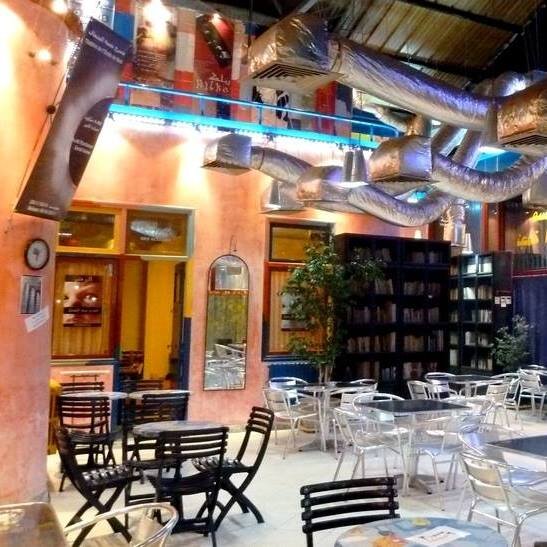Revolution Over Drinks
"Freedom is hammered out on the anvil of discussion, dissent and debate".
- Hubert H. Humphrey, former vice president of the United States of America.
Food and beverages have long been the subject of polarising debate; just mention the words ‘pineapple on pizza’ to watch a room degenerate into madness in under thirty seconds. Equally venomous dissent is also elicited by beverages (Pepsi vs Coca-Cola anyone?). Humorous debates aside, food and beverages have also proven to be a source of serious discussion, as cuisine invariably intersects with many vital facets of our contemporary lives; climate change, cultural heritage, and personal health to name a few.
Yet if we assume, as this writer believes it is safe to do, that Humphrey was alluding to notions of freedom on a socio-political level, and not that of a culinary level, then the roles of food and beverages greatly diverge. If no longer the subject of debate, food becomes largely irrelevant. This is because food, and the spaces in which we enjoy it, are ill suited to the facilitation of debate. Not only does one have to negate the practical issues which include limited seating, but also the decorum-laced minefield associated with eating and talking. Even if we overlook the issues of these immediate impracticalities – to the horror of our Victorian forebears - complications continue to incessantly appear, much like Oliver Twist when there is a hot pot of gruel on the go.
Firstly, passionate discussion, dissent and debate can often be difficult to find, or somewhat awkward to execute in one’s immediate circle. And although admittedly us Britons (and I am sure our American cousins) have become more nuanced at this practice over the last 5 years or so, it remains a brave or foolish soul who continuously initiates verbal sparring sessions with those that they share a life with. This barrier to dinner table debate is formidable as it remains a fact that when we dine with others, we nearly always do so with those closest to us.
Secondly, it is generally true that those closest to us, and those who are only one handshake away, share a great deal more in common with us than perfect strangers do. This writer would suggest that these commonalities can often be the enemy of balanced debate, with various viewpoints invariably being overlooked by a group with similar lived experiences. Historically hierarchical and segregated social systems have added to this issue by severely limiting opportunities for the requisite mixing to occur within dining rooms and other public spaces.
Diversity of background and experiences are a necessity then, and this leads us to our final issue, public eating spaces have very rarely, if ever, been designed with inter-table discussion in mind. I don’t know about you, but I cannot imagine leaning over and striking up a discussion on the finer points of the British fishing industry with a neighbouring table whilst they stoically munch through their prawn cocktail entrée.
These spatial and social barriers have only been consistently and radically upset in a handful of settings, the most notable being pubs, coffeehouses, tea rooms, and other drinking establishments. Within these walls strangers from all walks of life sit – often plied with social lubricants – shoulder to shoulder and face to face with each other for prolonged periods of time. The resultant plethora of debate which has emerged in these spaces over hundreds of years proves drinking establishments to be far superior at promoting meaningful discussion than their culinary counterparts. A moment of self-reflective thought makes this seem painfully obvious. How many strangers have you befriended in pubs as opposed to restaurants? Where do you go to put the world to rights and complain loudly about the tyrannical nature of your boss?
https://www.gjenvick.com/Epicurean/CoffeeAndTea/EarlyParisianCoffeeHouses-1922.html
Whilst it is true that these cathartic announcements are essential for our health, drinking establishments have a far greater, usually untapped, social potential. Their unique, egalitarian nature when mixed with readily available, tongue loosening wares and conversational conducive seating arrangements ensure that an ability to drive dramatic social change, or even revolution, has become a hallmark of global drinking establishments. The commonalities which these establishments share, regardless of their location, have not only created an environment where individuals such as Rosseau, Hemingway, Scott Fitzgerald, Satre and many more could drive world altering cultural advancement, but also provided the right circumstances for revolutionaries, radicals, or rebels – depending on your viewpoint - to make use of the anvil Humphrey referred to.
We often have a strange notion that revolutions occur as instantaneous events. In reality, they rely on philosophies, ideologies and plans that just like crops, need time and a nurturing environment in which to develop. A safe space, not just for balanced discussion, but for the trading of lived experiences, where the injustices felt by one are mirrored by many and a mass of individuals are unified by a common struggle.
Drinking establishments have proven time and again to be the perfect ecosystem for these social ideologies to grow from seedling, to fruit ripe for the picking. It is not by chance that the Boston Tea Party of 1773 was hatched at the Green Dragon Tavern, Paris's Café de Foy hosted the call to arms for the storming of the Bastille in 1789 or that the suffragettes consistently organised meetings in the Tea Cup Inn from 1910 onwards. These establishments were the heartbeat of each respective revolution, a fact largely attributable to the social interaction which by their nature they encouraged.
Unsurprisingly, the threat that an intellectually inquisitive populace poses, and the promise of change which they stand for is not welcomed by all. One historical French royalist expressed his distaste by stating.
“Where does so much mad agitation come from? From a crowd of minor clerks and lawyers, from unknown writers, starving scribblers, who go about rabble rousing in clubs and cafés. These are the hotbeds that have forged the weapons with which the masses are armed today.”
The elite minority's distrust of this "arming" and "rabble rousing" of the masses has endured throughout history. Consequently, drinking establishments have long been the overriding victims of authoritarian crackdowns with cafes, tearooms, and pubs often the first establishments targeted by overzealous rulers.
This is perhaps no more apparent than in China where the Chaguan or teahouse has been viciously oppressed by imperialists, republicans, and communists alike over the last 100 years. During this time, as immortalised by Lao She’s iconic play Teahouse, it was not uncommon to see signs pleading “No talk of state affairs”, or grey-gowned secret police arresting customers for questioning the government. In fact, She highlighted perhaps some of the more lenient punishments with the most brutal oppression of the Chaguan occurring under Chairman Mao’s cultural revolution which occurred from 1966 - 1976. During this period, the age old and culturally vital practice of slow tea-sipping was labelled as a vain, inefficient, and lazy practice. Fanatical red guards, emboldened by Mao’s abandonment of traditional values, used this as an invitation to violently close and destroy numerous antique tearooms, in a practice of systematic brutality which remains a hallmark of Maoist China to this day.
In Britain, whilst coffee houses were temporarily banned by Charles II in 1675, suppressive actions have predominantly focused on tackling that cornerstone of British culture, the pub. Historically free to serve anything, to anyone, at any time, pubs were suppressed in a less vicious yet no less effective way by the British parliament in the wake of the industrial revolution. The Intoxicating Liquor Bill, which was passed in 1872, defined drunkenness as a criminal offence and restricted pub opening hours, effectively forcing the closure of countless pubs nationwide. This being a result of the state seeking to maximise the efficiency of its workforce. The Bill, which was opposed by over 800,000 signatures not only minimised drunkenness but also limited opportunities for workers to band together and discuss the injustices done to them. Thus, ensuring that Britain’s productivity continued to soar at the expense of its populace’s quality of life.
In the present day, these long-lasting cultural and legislative pressures have been compounded by the rise of the internet which has irrevocably coincided with a decline of stranger-to-stranger engagement within public spaces. The ability to reach millions instantly, debate topics with a near unlimited number of strangers, as well as the ease of organising mass events has meant that in the contemporary world, social engines such as Twitter are fulfilling the revolutionary roles historically held by drinking establishments. This was made no more apparent than during the Arab Spring of 2010-2012, where social media was utilised heavily by both pro and anti-government protesters to facilitate communication, raise local and global awareness of their struggles and to disseminate information about their activities.
With such drastic changes afoot, you would be forgiven for thinking that drinking establishments no longer have a place in the world altering theatre of revolution. However, it was during the height of the Arab spring that Café Riche in Egypt established itself as a makeshift hospital for injured activists, and as a space where the revolution was observed, unpacked, and understood by all. Furthermore, in Tunis, the freewheeling Théâtre de l’Étoile du Nord remains to this day a haunt for several figures who gained fame in the Tunisian revolution of 2011, leading the New York Times to label it as "A Cafe Where the Spirit of the Arab Spring Lives On". Both examples suggest that instead of being made obsolete, drinking establishments have remained as vital to the revolutionary process as ever, albeit in modernised, fluid roles. It seems to be that the cultural and communal importance of these shared spaces, where stories have been traded, miseries soothed and good times had, continues to draw people towards them in times of crisis.
The frequency of these crises shows no sign of diminishing as global society continues to value productivity above all else. Concurrently, the rise of individualism has continued unabated, driving communities apart on social, cultural, and political levels. Whilst social media, once thought to be the answer to this division has now been confirmed as one of its greatest sources. Thus, we have never been more in need of drinking establishments. As their inherent sociability and communal values make them one of the few places where real life human interaction continues to thrive. A barista’s smile, the sharing of a newspaper and a spontaneous conversation are all examples of exchanges which add a warmness to our day. A warmness which cannot be replicated by emoji’s or likes.
The importance of these fleeting moments has only become apparent since we found ourselves bound to house and home. This writer fervently hopes that our painful realization is not squandered and forgotten once society regains its normalcy. It is high time we all recognise that slowing down and engaging with strangers, when safe to do so, is not mere idleness; it is revolutionary.
-Jacob Smith
Jacob is a writer whose focus centres on the ever-evolving relationship between peoples. He has a long-held affinity for food and cooking, a fact chiefly attributable to his mother, Liz. Outside of writing, Jacob is the Social media and Communications Officer for Incomindios UK, the British branch of a Swiss-based indigenous rights organisation and is currently concluding his MA Conflict, Security & Development at the University of Exeter.
Find him on Twitter: @JacobSm10470232





